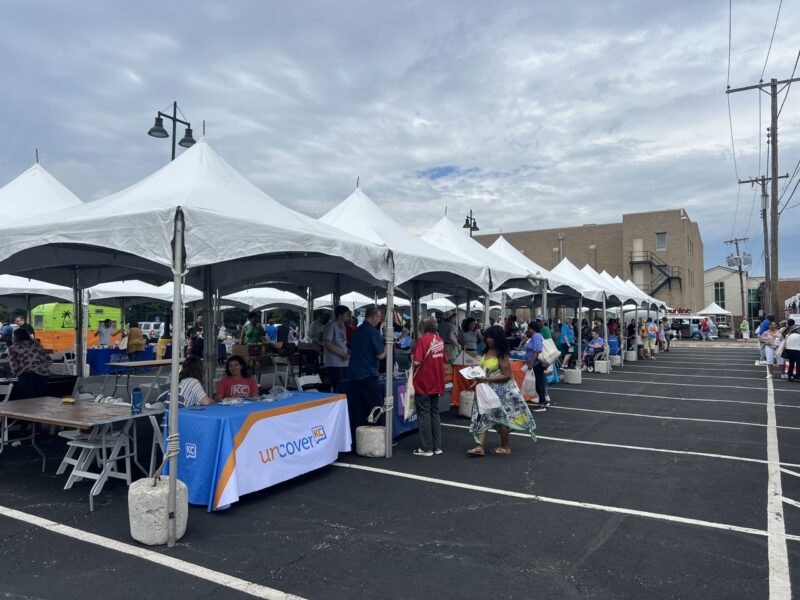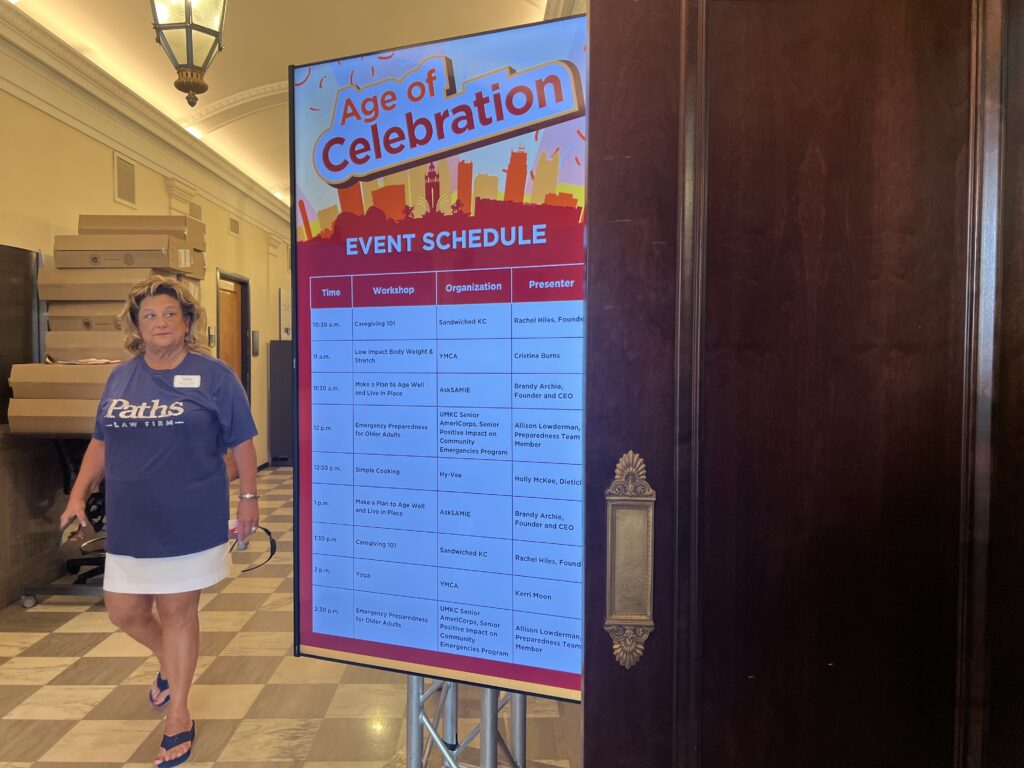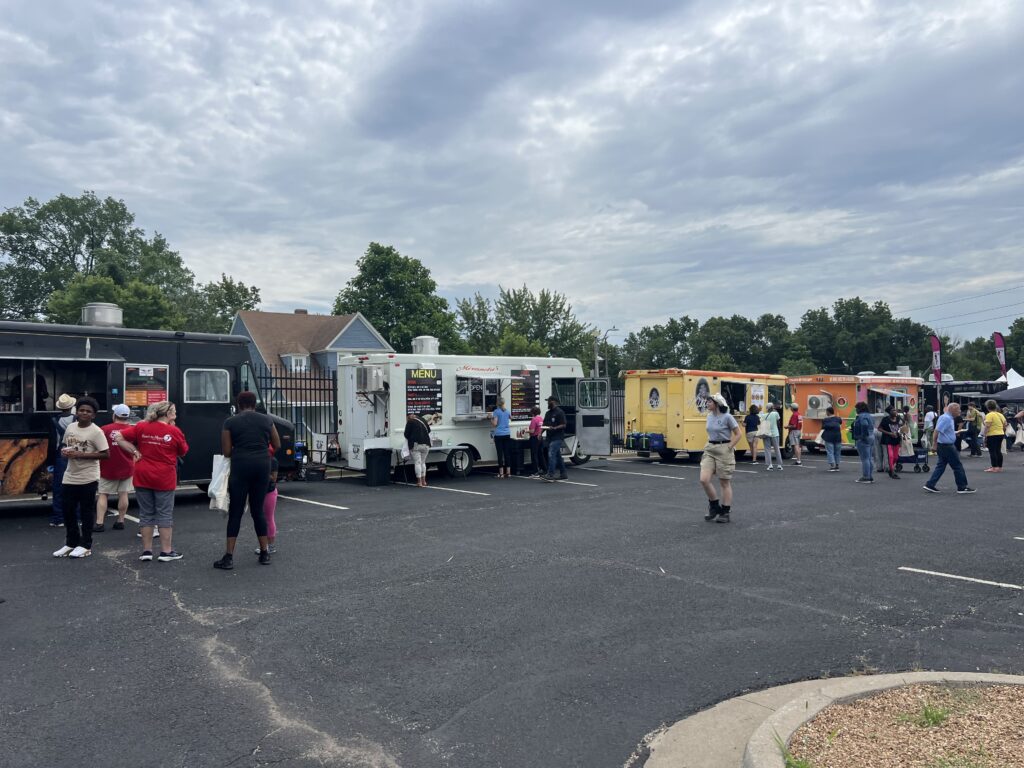
Emily Wheeler
Editorial Intern
It is said age is just a number, and the mid-America Regional Council (MARC) embodied this sentiment with its Age of Celebration event June 28. This free block party included health and wellness vendors, resources for aging in place, free food and refreshments, engaging activities, live music and guest speakers.
According to MARC Aging and Adult Services, today’s older demographic faces many challenges: inadequate savings and delayed retirement, chronic health conditions, lack of caregivers, limited transportation options and inappropriate housing stock. MARC offers various services to enhance golden adult’s quality of life, promote independence and support caregivers. In-home services provided by MARC include light housekeeping, chores and personal care. A variety of nutrition programs, caregiving support, and transportation services are provided by MARC.
The real need for this Age of Celebration became apparent when the MARC Aging and Social Services team completed a listening tour throughout Kansas City neighborhoods.
“The need for awareness and visibility was front and center,” said Kristi Bohling-DaMetz, MARC director of aging services. This event’s success was largely due to months of planning and a strong emphasis on understanding community needs.
According to Pendleton Heights Neighborhood Association President Jonathan Cokely identifies language barriers as being a challenge for the Historic Northeast, making it difficult to understand residents’ needs and desires for events. “Over 100 languages are spoken in the Northeast. What is important is figuring out how to hear the concerns of everyone and how to provide accessible information,” he said.
Planning such an important event was a collaborative effort. Alana Henry, executive director of the Ivanhoe Neighborhood Council, played a role in its development. She said one of her primary goals was ensuring accessibility. “It was really important to me that we were cognizant of barriers,” Henry said. Shuttle buses were available for those who had to park far from the event’s entrance, and resources were provided for attendees needing navigation assistance.
The U.S. Census Bureau projects adults 65 and older will outnumber children under 18 by 2035. “This trend is such a steep climb,” Bohling-DaMetz said. “We need to start building this infrastructure now, we must be prepared for it.”
“My first thought was ‘Why has no one done this before?’’’ said Lane Foster, volunteer coordinator for Kansas City Hospice. “Having readily available information about your options is valuable. It’s a need that no one thinks about until it directly affects them,” Foster said.
She spent the day educating seniors and caregivers about hospice care myths, and resources Kansas City Hospice provides, such as grief counseling, palliative care and long-term, senior caregiving.
With an increase in the senior population, it creates a greater demand for senior care. “There’s a shortage of space in care facilities; there simply isn’t enough room for the influx of seniors we are seeing,” Bohling-DaMetz said. Beyond the lack of vacancies in senior care centers, the expense is a significant issue — leading more seniors to choose to stay at home.
Elderly individuals frequently face obstacles when living at home including home repair, which is a big hurdle for many. This primarily stems from a combined reduced financial resources and physical limitations. Budgeting for expensive repairs on a fixed income is not always possible. Limited physical capabilities can hinder the ability to perform repairs independently and safely. Without adequate support and resources in place, these challenges can escalate over time — making it increasingly difficult for older adults to maintain safe and comfortable living environments.
Henry recalled the story of an older couple who was forced to climb a hill to access the upper level of their house because their stairs were in such a state of disrepair. “No one should have to exit their house and climb a hill to live at home,” Henry said.
“Home maintenance is a big concern for many,” said Henry. The Ivanhoe Neighborhood Council currently has a program for minor home repairs, with 90 requests waitlisted. “And that is just a small portion of people who need assistance,” Henry said.
This Age of Celebration event also focused on nutrition. A simple cooking workshop, sponsored by Hy-Vee, addressed food-related issues, which also impact the health and well-being of older adults. Nutritional deficiencies are a significant challenge faced, often due to a reduced appetite, resulting from changes in smell, taste or dental issues.
Limited mobility and transportation difficulties may restrict their ability to access grocery stores or prepare meals, leading to inadequate nutrition. MARC has a food delivery program for individuals 60 or older who are physically or mentally unable to leave their home. These meals are planned by a registered dietician to ensure one-third of the Recommended Daily Allowance (RDA) of nutrients for adults. Call 816-421-4980 to ensure eligibility. For older adults who are not home-bound, group meals are available at MARC Senior Community Centers.
Fixed incomes are also a concern, and may constrain their budget for nutritious food choices, potentially resulting in a reliance on cheaper, less nutritious options. Health conditions such as diabetes or hypertension may require dietary modifications that older adults find challenging to maintain without proper support.
Addressing these food issues requires community initiatives, accessible food assistance programs and healthcare support tailored to the specific nutritional needs of older individuals.
Double Up Food Bucks — created by the Double Up Heartland Collaborative — makes it easier for low-income families to eat fresh fruits and vegetables, while supporting family farmers and growing local economies. Available to all SNAP users, the program matches every SNAP dollar spent on fresh produce (up to $25 per day) with a dollar in rewards that can be used for more fresh produce. This program is accepted at more than 75 farmers markets and participating grocery stores across Kansas and the greater Kansas City area.
“The need for another event like this is obvious,” Bohling-DaMetz. said. “There is interest and understanding of how valuable this event is and can be. The biggest hurdle to hosting another event will be funding. A lot of this event was supported by COVID funding,” she said. “We are going to need more than just state and federal aid to start meeting our goals; we need to be locally backed as well.”
This Age of Celebration event highlighted the growing needs of older adults in the community and underscored the importance of accessible resources and support systems. The success of this event demonstrates the necessity for continued efforts and funding to address these challenges.


















